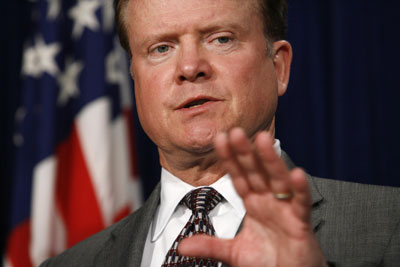Top Biz News
US senator opposes Blackstone deal
(Reuters)
Updated: 2007-06-21 11:37
 |
Large Medium Small |
 U.S. Senator Jim Webb speaks about the bill he introduced that would prohibit the use of funds for military operations in Iran without congressional authorization during a news conference in the Capitol in Washington March 5, 2007. [Reuters] |
US Senator Jim Webb asked federal authorities on Wednesday to look into "national security implications" he said are posed by Chinese government involvement with Blackstone Group LP as it moves toward a stock offering expected to raise more than $4 billion.
Webb raised concerns in a letter to Securities and Exchange Commission Chairman Christopher Cox, Treasury Secretary Henry Paulson and Homeland Security Secretary Michael Chertoff.
In the letter, Webb said SEC records show Blackstone's holdings include military and satellite technology companies.
"If true, it is incumbent upon the SEC and the Committee for Foreign Investment in the United States (CFIUS) to ensure that this technology not be acquired by the government of China," the Virginia Democrat wrote in the letter.
New York-based Blackstone, one of the nation's largest private equity firms, agreed in May to sell a $3 billion stake to China's state investment company ahead of the IPO.
Blackstone declined to comment.
Webb asked the SEC to delay the Blackstone IPO "until such time as serious questions about this transaction can be carefully examined and resolved."
| |||
An SEC spokesman declined to comment.
Webb said the Blackstone matter "falls squarely within CFIUS' mandate to assess whether foreign investment might threaten national security and to ensure the protection of sensitive United States information relating to national defense and critical infrastructure."
| 分享按钮 |
